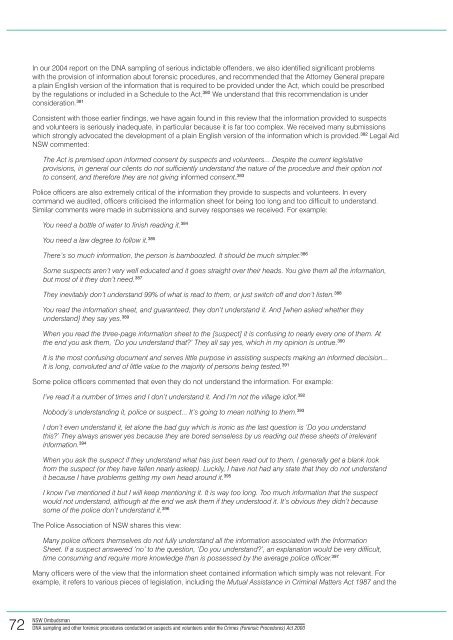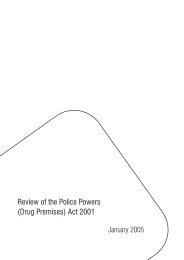Crimes (Forensic Procedures) Act 2000 - NSW Ombudsman - NSW ...
Crimes (Forensic Procedures) Act 2000 - NSW Ombudsman - NSW ...
Crimes (Forensic Procedures) Act 2000 - NSW Ombudsman - NSW ...
Create successful ePaper yourself
Turn your PDF publications into a flip-book with our unique Google optimized e-Paper software.
In our 2004 report on the DNA sampling of serious indictable offenders, we also identified significant problems<br />
with the provision of information about forensic procedures, and recommended that the Attorney General prepare<br />
a plain English version of the information that is required to be provided under the <strong>Act</strong>, which could be prescribed<br />
by the regulations or included in a Schedule to the <strong>Act</strong>. 380 We understand that this recommendation is under<br />
consideration. 381<br />
Consistent with those earlier findings, we have again found in this review that the information provided to suspects<br />
and volunteers is seriously inadequate, in particular because it is far too complex. We received many submissions<br />
which strongly advocated the development of a plain English version of the information which is provided. 382 Legal Aid<br />
<strong>NSW</strong> commented:<br />
The <strong>Act</strong> is premised upon informed consent by suspects and volunteers... Despite the current legislative<br />
provisions, in general our clients do not sufficiently understand the nature of the procedure and their option not<br />
to consent, and therefore they are not giving informed consent. 383<br />
Police officers are also extremely critical of the information they provide to suspects and volunteers. In every<br />
command we audited, officers criticised the information sheet for being too long and too difficult to understand.<br />
Similar comments were made in submissions and survey responses we received. For example:<br />
You need a bottle of water to finish reading it. 384<br />
You need a law degree to follow it. 385<br />
There’s so much information, the person is bamboozled. It should be much simpler. 386<br />
Some suspects aren’t very well educated and it goes straight over their heads. You give them all the information,<br />
but most of it they don’t need. 387<br />
They inevitably don’t understand 99% of what is read to them, or just switch off and don’t listen. 388<br />
You read the information sheet, and guaranteed, they don’t understand it. And [when asked whether they<br />
understand] they say yes. 389<br />
When you read the three-page information sheet to the [suspect] it is confusing to nearly every one of them. At<br />
the end you ask them, ‘Do you understand that’ They all say yes, which in my opinion is untrue. 390<br />
It is the most confusing document and serves little purpose in assisting suspects making an informed decision...<br />
It is long, convoluted and of little value to the majority of persons being tested. 391<br />
Some police officers commented that even they do not understand the information. For example:<br />
I’ve read it a number of times and I don’t understand it. And I’m not the village idiot. 392<br />
Nobody’s understanding it, police or suspect... It’s going to mean nothing to them. 393<br />
I don’t even understand it, let alone the bad guy which is ironic as the last question is ‘Do you understand<br />
this’ They always answer yes because they are bored senseless by us reading out these sheets of irrelevant<br />
information. 394<br />
When you ask the suspect if they understand what has just been read out to them, I generally get a blank look<br />
from the suspect (or they have fallen nearly asleep). Luckily, I have not had any state that they do not understand<br />
it because I have problems getting my own head around it. 395<br />
I know I’ve mentioned it but I will keep mentioning it. It is way too long. Too much information that the suspect<br />
would not understand, although at the end we ask them if they understood it. It’s obvious they didn’t because<br />
some of the police don’t understand it. 396<br />
The Police Association of <strong>NSW</strong> shares this view:<br />
Many police officers themselves do not fully understand all the information associated with the Information<br />
Sheet. If a suspect answered ‘no’ to the question, ‘Do you understand’, an explanation would be very difficult,<br />
time consuming and require more knowledge than is possessed by the average police officer. 397<br />
Many officers were of the view that the information sheet contained information which simply was not relevant. For<br />
example, it refers to various pieces of legislation, including the Mutual Assistance in Criminal Matters <strong>Act</strong> 1987 and the<br />
72<br />
<strong>NSW</strong> <strong>Ombudsman</strong><br />
DNA sampling and other forensic procedures conducted on suspects and volunteers under the <strong>Crimes</strong> (<strong>Forensic</strong> <strong>Procedures</strong>) <strong>Act</strong> <strong>2000</strong>

















